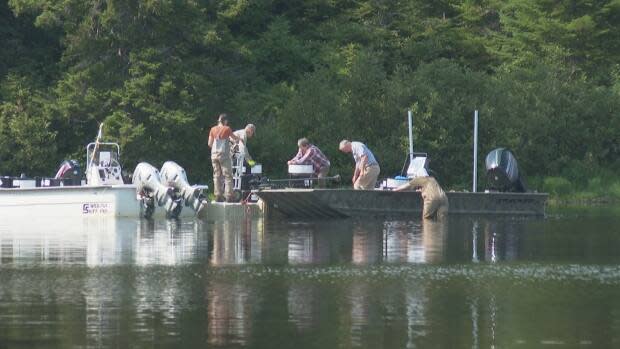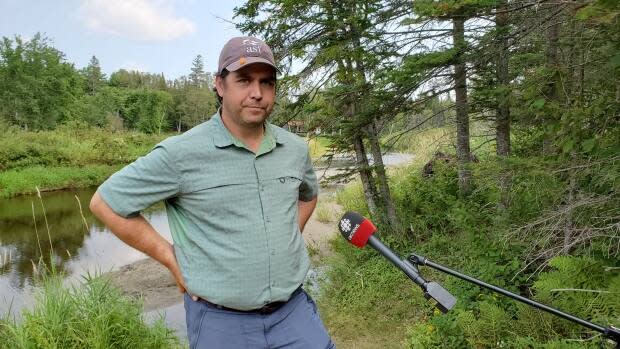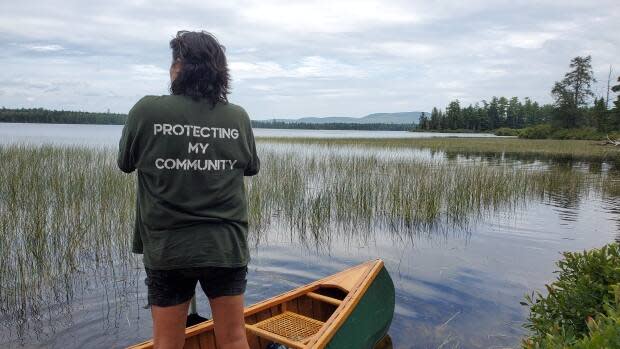Meetings with Wolastoqey held, rotenone spraying in Miramichi delayed until 2022

After being delayed by women concerned about its safety, a chemical-spraying project to control the smallmouth bass population in Miramichi Lake has been put off until next year.
In August, Wolastoqey grandmothers and mothers paddled canoes on the lake, preventing volunteers from spraying it with rotenone — a fish-killing pesticide. The chemicals can't be sprayed when people are on the water.
The Atlantic Salmon Federation filed a court injunction to remove the women, but it was dismissed because Wolastoqey were not present at the hearing.
Neville Crabbe, a spokesperson for the Working Group on Smallmouth Bass Eradication in the Miramichi, said the group has held four community meetings since then to explain the purpose of the rotenone spraying.
He said the meetings held at Woodstock, Tobique, Kingsclear and St. Mary's First Nation were constructive, but "this is not a reopening of consultation."
"It takes people a little bit of time to kind of think about the project, to digest the information and ultimately to understand why we're doing what we're doing, and why it's the only option."
According to the Department of Fisheries and Oceans Canada, smallmouth bass are considered an invasive species in southern and western New Brunswick.
Members of the working group include the North Shore Micmac District Council, Atlantic Salmon Federation, Miramichi Salmon Association, the New Brunswick Wildlife Federation and others.
The federal government had approved the spraying, and salmon conservation groups say smallmouth bass have been threatening Atlantic salmon as well as brook trout.
Crabbe has referred to two years of Crown-led consultation with Indigenous people, but at the time the spray project was paused during the summer, some proponents agreed more consultation was still needed with Wolastoqey First Nations.
Andrea Polchies of Woodstock First Nation, one of the paddling in August, said she has now attended the meeting in her community and she came out unconvinced that the risk of poisoning the lake is worth the reward of killing off the bass.
"We came out of that meeting and … we we kind of had an impromptu vote. And I'd have to say 95 per cent of us said, no, you're not going to poison the water," Polchies said.

She said she does not want to see other animals being "collateral damage" to the pesticide.
Rotenone kills any species of fish within minutes but was found to not cause serious harm to humans in a 2020 study.
The pesticide is made from the root of certain bean plants and biodegrades in water over a period of two weeks to 30 days or more depending on conditions.
The use of rotenone has been approved for use by Health Canada, but Polchies said historical treatment of Indigenous people by federal agencies and government does not inspire confidence in Health Canada.
"We don't have a good relationship with Health Canada," she said. "They were one of the ones that helped do all these experiments on all our residential [school] kids."

In the case of Miramichi Lake, treatment would have killed almost all species of fish. The plan was for native fish to be repopulated naturally or transplanted from elsewhere.
Crabbe said rotenone can only be applied between August and October, so with the window closing, the project will go ahead in the summer of next year.
"It will happen in 2022, we're confident of that," he said.
"Doing nothing or simply managing smallmouth in the Miramichi will have the same result and it's not benign," he said. "We are proposing the one-time use of an approved pesticide in a tiny part of the watershed for the benefit of the entire 13,500 square kilometre ecosystem."
Polchies said her plan next year is to "just go back on the water.
"There's nothing good about this," she said.

